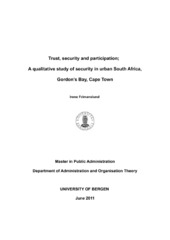| dc.description.abstract | The issue of human security and the managing of it has been, and continues to be, of scholarly importance in relation to democratic development. In South Africa this issue has always been of concern, not just during the apartheid era, but also before and after. Since the transition to democracy in 1994, the country has experienced massive challenges in their quest for democratic development. Issues such as race, poverty and inequality are all issues to consider when one is a student of security in the South African context. This thesis explores security in relation to trust, civil society and the relative context in which the security regimes in South Africa have been forged. The study explores how informants from one community in Gordon's Bay experience their feeling of security in relation to their own social context. The empirical findings in the study are based on interviews with 10 people situated in Gordon's Bay, South Africa. The interviews were conducted in May 2010. | en_US |
